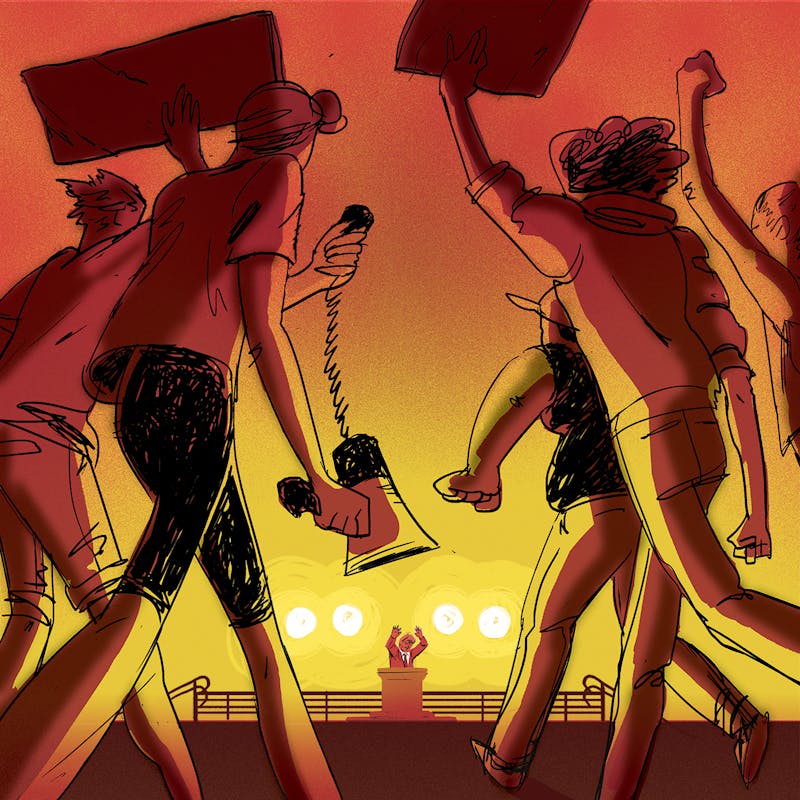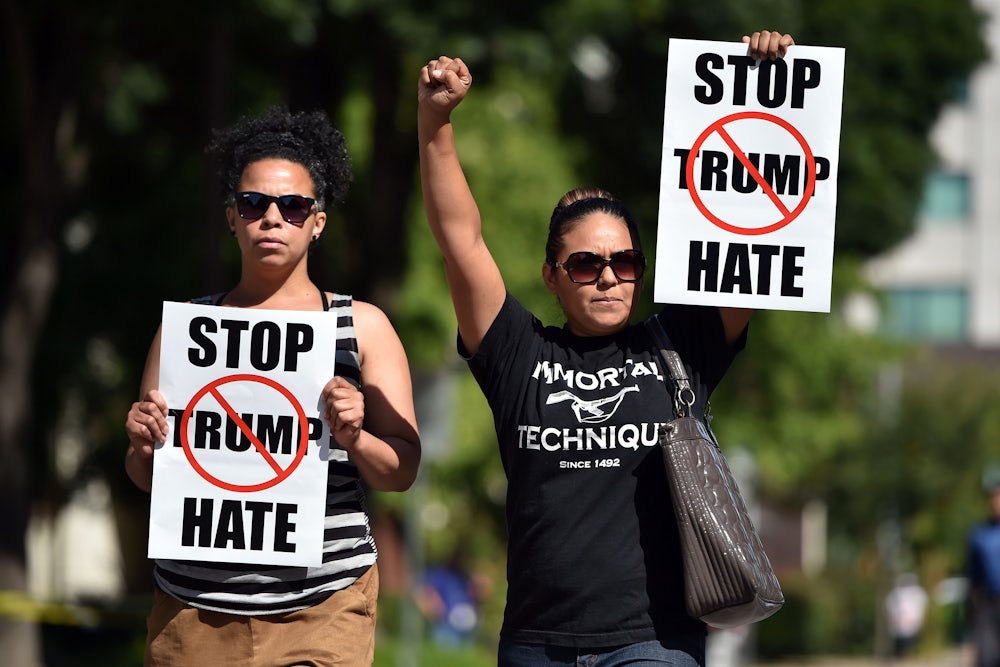“You’ve been tough on me,” he said, “but I love you.”
It was last summer, and there I was, in the lobby of the NBC building in New York, confronted with the flaming orange visage that is Donald Trump. He was being gracious. I had just finished criticizing him on a daytime talk show, and our paths had crossed in front of the elevator bank. He commandeered my phone to ask my wife if I was treating her well. Before we parted, he added, “If I had your brains, I’d be president.”
There’s no question that Donald Trump has “uuuuge” charisma, a brutally appealing magnetism that amplifies the most virulent rumblings of racism, misogyny, and xenophobia this country has reckoned with in quite some time. Each election, we hear that this run for the presidency says more about who we are than any other—Obama defines us, Reagan embodies us, Shrub will be the ruin of us all. We’ve become inured to the get-out-the-vote sales pitch; the nation endures. And yet this election is indeed the most eventful of my lifetime, and perhaps the most important.
Now that Trump has vanquished his primary foes, his final combat with the Democrats is fast approaching. But first comes the spectacle of his official coronation at the Republican National Convention in Cleveland. The question is no longer whether Republicans will come to their senses. The question is what those of us who care about America must do, given that they will not.
I laughed when Trump paid me a compliment while imagining his own rise. I didn’t take him seriously, even a year ago. Who did? Very few of us. But now, when his offhand joke reads like prophecy, the circumstances demand more than good-natured forbearance or a witty riposte. Cleveland, the convention, is where we must begin to make our stand against Trump and the malignancy he represents.
I know that these words can be read as a call to violence unseen at a national political convention since Chicago in 1968. So be it. As Martin Luther King Jr. taught us, it is a risk we must take. We have a positive moral obligation to protest the nomination of this racist demagogue for president.
It is not simply a matter of voicing disapprobation for Trump; his supporters, too, must be answered. They are driven by rage that a black man today still represents a nation that once held black folk in chains, and which still depends on the law to check their social and political aspirations. Barack Obama so spooked the bigoted whites of this country that we are now faced with a racist explicitness that hasn’t emerged since the height of the civil rights movement.
Trump, more than anything else, signifies the undying force of the fear unleashed by Obama’s presidency. He exploits the emotions dredged up by his rhetoric, manipulating a confused and self-pitying white public. And so we must go to Cleveland, not to derail Trump’s nomination. Instead, we protest to proclaim the man’s moral repugnance and political illegitimacy. It is an opportunity, with the whole world watching, to declare Donald Trump the worst of the American political mind and soul.

The time to sit idly by has passed. To paraphrase Marx, pundits and critics—and even sympathizers with moral principles—interpret the world, but the point is to change it. You can’t do that from the comfort of an office cubicle, through a Tweet, or even in a church sanctuary. The deeds of hate being cooked up by Donald Trump, directly or implicitly, must be met with the willingness of good folk to speak up, and most important, to show out. And with that knowledge, some Americans—and I expect many of them to be black—will venture to Cleveland with pure hearts and revolutionary intentions.
Yes, yes, some will say—but not all Republicans are like Trump, or even like Trump. We must take care not to harm potential allies at the convention. It is true that the Republican establishment has finally, though unconvincingly, rebelled against Trump. But it was these same “reasonable” Republicans who ignored his early impact—declined to give him oxygen, as they say—and refused to listen to those who insisted that his vitriol was destructive to the country. As long as it didn’t impact Republican interests, the lives Trump imperiled didn’t matter. Now those same Republicans are angry, and ashamed, and fearful of what Trump has become. But let us not forget that Frankenstein is the name of the doctor who invented the monster, not the monster itself. The party for which he is now standard-bearer must be held accountable for his creation.
My views would most likely contradict the counseled civility of Barack Obama. He has taken recently to chastising Black Lives Matter—chiding them for shouting down politicians when they should instead be listening. It seems unlikely that he’d countenance a physical resistance against those who have enabled the American instinct for antipathy. Black lives, he would say, ought not be lost to the police—who are too rarely able to distinguish whether black folk commit crimes or are themselves the crime. He is right in this regard. But it saddens me that the central figure arousing the white fury that has engulfed America would discourage the vigorous response of black people who don’t cotton to his centrist reform values.
For me, this is the great risk inherent in unforgiving protest in Cleveland. On Trump’s long roster of “others”—black folks, women, Latinos, Muslims, all those he has maligned or threatened or undermined—blacks will likely suffer the most. Black bodies in America are carriers of the most virulent strain of otherness. Our existence is a viral bad act that must be contained, under any circumstance, even legal political protest. The police might take for themselves the role of white hero, bravely acting to arrest “black thuggery” before it can spread, or in the case of dissent, before it can even begin. In calling for confrontation, I am probably bringing down the worst violence against my own people, asking them—us—to stand in the vanguard of challenging bias and hatred. The penalties will be higher for my people than for others. But then, there is nothing new in that.
It wasn’t so long ago, just eight years, that Obama led millions of white Americans to believe that they were voting for a transformational figure. He would change the country permanently for good. A vote for him was a vote for decency and intelligence to prevail over hate and chaos. It meant, simply, being on the right side of history. Yet his impact has been so quickly and thoroughly eclipsed by a pervading sense of racial and national doom. What many of us didn’t see coming is that Obama’s success would contain the roots of his failure. The election of the nation’s first black president tapped into a deep vein of escapist hope, a painless way to heal our historic wounds. And too many people—more than I could bear to imagine—resented Obama’s rise and began to plan for his, and our, demise. What we did not fully understand, or account for, is the deep-seated, intractable anger of white Americans who never viewed Obama as the answer to any question or desire they’d ever had. Donald Trump has taken advantage of these people, harangued them and praised them, promised them a different transformation, one that returns the country to what they would like to believe it once was: theirs.
We have moved backwards in so many ways since the high point of Obama’s first election. Our only hope to preserve the first, fragile tendrils of the new era that it promised is to say no to Donald Trump. Those of us who rallied around Obama, no matter our disappointment in what he failed to deliver, or what we failed to demand of him, should remember that much good came of his presidency, not least in that it kept at bay the political goons who would feed poison to our nation’s fevered racial imagination.
I would argue that to resist the sweep of malevolence signified by Trump’s prominence is a tragic counterpoint to a vote for Obama in 2008. It is the only way to find the right side of history again. There is no option but to go to Cleveland, to raise our voices, put our bodies to work, and maybe even at risk. What injury may come seems meager in comparison to the social violence that Trump’s election portends. No more compelling is the belief that street protest at the convention could cause even greater divides throughout the country. The racism, misogyny, and nativism that would be unleashed during a Trump administration would be far worse than any conflict that could arise from legitimate protest.
How bad could it be in Cleveland? It’s hard to say. If the force used against Black Lives Matter protesters in Ferguson and Oakland and Baltimore is any gauge, it may be very bad indeed. But if King proved anything, it’s that the threat of violence mustn’t dissuade from acting those who would do good. In fact, King used violence, integrating it into his strategy of civil disobedience. Displays of white madness let the nation in on its dirty secret: It was willing to blast black bodies with water hoses, and unleash police dogs on innocent black flesh. King sacrificed black bodies to make white America look plainly at its barbarism. Trump’s convention may be the next proving ground for this costly technique.
